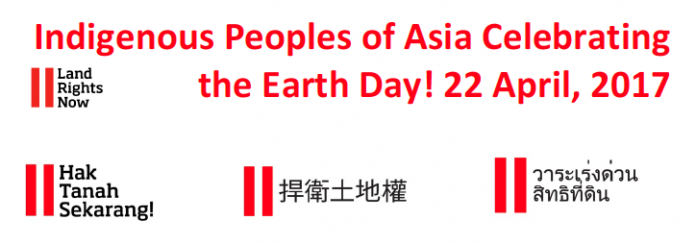Collective land rights are essential for us as indigenous peoples to enjoy our human rights and more importantly for the world to fight climate change. We, therefore, should mobilize all our communities, organizations and networks, and strengthen and expand collaboration with the supporting human rights and civil society actors to join us and take concrete actions to fight the threat of climate change by securing our land rights now!!!
“Secure Indigenous Peoples’ #landrightsnow to Combat Climate Change!”
Since the time of our ancestors, indigenous peoples across the world have been the guardians of the Mother Earth. As a collective entity, indigenous peoples play vital role and has a significant contribution to the conservation and sustainability of the biodiversity and the world’s ecosystems.
With an estimated number of more than 250 million, Asia remains the region with the highest number of indigenous population in the world. We, the indigenous peoples of Asia, are living in rainforests, wetlands, mountains and coastal areas and using the concept of collective land rights and natural resources management as the basis of our life cycle for centuries. We govern our lands, territories and resources together as biodiversity hotspots that regulate water flows, sequester carbon and maintain the ecological balance of the planet earth.
Despite our contribution and role in protecting the planet, most of our governments still do not recognize our rights to our lands, territories and resources. In Thailand, many indigenous peoples are being or can be evicted at any moment because their ancestral territories have been claimed and designated by the Thai government as national park and protected areas. Similarly, in Indonesia and Malaysia, thousands of indigenous families have been severely impacted by the massive palm oil plantation projects in the countries while indigenous peoples in coastal areas are also becoming one of the most vulnerable groups impacted by the significant change of the climate. Moreover, implementation of the laws and policies recognizing indigenous peoples’ land rights such as the Forest Rights Act in India, Land Law in Cambodia, the Indigenous Peoples Rights Act in Philippines is still profoundly questioned.
It is clear that securing indigenous peoples’ land rights is the cheapest way to combat climate change through, for example, carbon sequestration. It is also important if the world is to deliver on the promises of the Paris Agreement and keep warming under 1.5 degrees.
Collective land rights are essential for us as indigenous peoples to enjoy our human rights and more importantly for the world to fight climate change. We, therefore, should mobilize all our communities, organizations and networks, and strengthen and expand collaboration with the supporting human rights and civil society actors to join us and take concrete actions to fight the threat of climate change by securing our land rights now!!!
Source : www.aippnet.org
